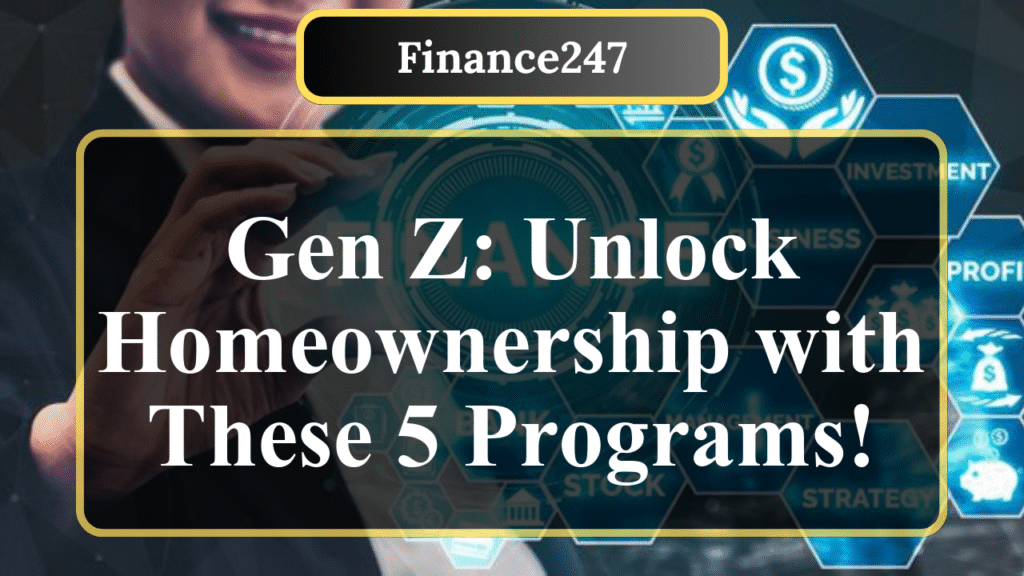Gen Z faces a tough housing market, but first-time homebuyer programs can ease the path to ownership. This article explores five key U.S. programs offering low down payments, grants, and flexible credit options tailored for young buyers. From FHA loans to state-specific assistance, these programs help Gen Z navigate high costs and achieve the American Dream.
Top Homebuyer Programs for Gen Z in the U.S.
The housing market in 2025 presents significant challenges for Generation Z (born 1997–2012), with median home prices at $422,000 and mortgage rates hovering near 7%. For young adults, often burdened by student debt and lower starting incomes, homeownership can feel out of reach. Fortunately, several first-time homebuyer programs across the U.S. offer financial relief through low down payments, grants, and flexible credit requirements. Here are five programs every Gen Z buyer should explore.
1. FHA Loans: Low Down Payments for Flexible Credit
Federal Housing Administration (FHA) loans are a go-to option for first-time buyers. These government-backed loans require as little as 3.5% down for those with credit scores of 580 or higher, or 10% for scores between 500 and 579. In 2025, FHA loans remain popular due to their lenient credit standards, making them ideal for Gen Z buyers with limited credit history. Additionally, FHA loans allow sellers to cover up to 6% of closing costs, reducing upfront expenses. However, buyers must pay mortgage insurance premiums, which can increase monthly payments.
2. Fannie Mae HomeReady Mortgage: Affordable Financing for Low-Income Buyers
Fannie Mae’s HomeReady Mortgage targets low- to moderate-income buyers, requiring just 3% down and allowing credit scores as low as 620. This program is tailored for Gen Z buyers earning up to 80% of the area median income (AMI), with features like cancellable mortgage insurance once 20% equity is reached. HomeReady also allows income from roommates or family members to qualify, a boon for young buyers pooling resources. In 2024, 36% of Gen Z and millennial buyers used family cash gifts for down payments, making this program’s flexibility a key advantage.
3. Freddie Mac Home Possible: Support for Very Low-Income Households
Freddie Mac’s Home Possible program offers down payments as low as 3% for buyers earning up to 50% of the AMI. With credit score requirements starting at 660, it’s slightly stricter than FHA loans but offers competitive terms for Gen Z buyers in lower-cost regions like the Midwest, where 13% of 2024 home purchase applications came from Gen Z. The program also supports co-borrowers, such as parents, to boost eligibility, and provides educational resources to guide first-time buyers through the process.
4. State and Local Down Payment Assistance Programs: Grants and Forgivable Loans
Many states and localities offer down payment assistance (DPA) programs, often as grants or forgivable loans for first-time buyers. For example, Colorado, Maine, and Minnesota have rolled out first-generation homebuyer programs in 2023, targeting those whose parents never owned a home. These programs typically cap eligibility at 150% of AMI and can cover 3–10% of the purchase price. In 2025, cities like Fort Wayne, Indiana, and Memphis, Tennessee, are hotspots for Gen Z buyers due to affordable markets and robust DPA options. Check your state’s housing authority website for specific programs.
5. USDA Loans: Zero Down Payment for Rural Homebuyers
For Gen Z buyers eyeing homes in rural or suburban areas, USDA loans offer 0% down payment options for households earning up to 115% of the AMI. These loans, backed by the U.S. Department of Agriculture, have no private mortgage insurance requirement, though they include a small guarantee fee. In 2024, USDA loans gained traction in affordable markets like Corpus Christi, Texas, where Gen Z buyers are increasingly active. Eligibility depends on the property’s location, which must be in a USDA-designated rural area, verifiable through the USDA’s online map.
Navigating the Application Process
To maximize these programs, Gen Z buyers should start by getting pre-approved for a mortgage to understand their budget. Working with a real estate agent familiar with first-time buyer programs is crucial, as 56% of Gen Z plan to buy within two years and need guidance on local grants. Additionally, improving credit scores and saving for closing costs (typically 2–5% of the home price) can enhance eligibility. Online tools from lenders like Newrez can help calculate affordability and connect buyers to suitable programs.
Disclaimer: This article provides general information based on publicly available sources, including government websites, industry reports, and real estate data. Always consult a licensed mortgage professional, real estate agent, or financial advisor for personalized advice before applying for homebuyer programs. Program eligibility and terms vary by location and income.


